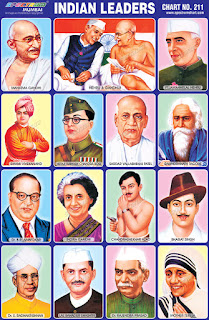 |
| Indian Leaders Chart |
Spectrum Chart - 211 : Indian Leaders
- Mahatma Gandhi – Mahatma Gandhi is known as the Father of the Nation. Employing nonviolent civil disobedience, Gandhi led India to independence and inspired movements for civil rights and freedom across the world. His birthday, 2 October, is commemorated as Gandhi Jayanti, a national holiday and world-wide as the International Day of Nonviolence.
- Pt. Jawaharlal Nehru – Jawaharlal Nehru was the first Prime Minister of India and a central figure in Indian politics before and after independence. He emerged as the paramount leader of the Indian independence movement under the tutelage of Mahatma Gandhi and ruled India from its establishment as an independent nation in 1947 until his death in 1964.
- Swami Vivekanand – Swami Vivekanand was the chief disciple of the Sri Ramakrishna Paramahansa. At birth, he was called Narendranath Datta. He was the founder of Ramakrishna Mission. He introduced Hindu philosophies of Vedanta and Yoga in Europe and America.
- Netaji Subhash Chandra Bose – Chandra Bose, affectionately called as Netaji, was one of the most prominent leaders of Indian freedom struggle. He founded Indian National Army (Azad Hind Fauj) to overthrow British Empire from India.
- Sardar Vallabhbhai Patel – Sardar Vallabhbhai Patel is popularly known as Iron Man of India. He played a leading role in the Indian freedom struggle and became the first Home Minister of India. He is credited with achieving political integration of India.
- Rabindranath Tagore – He was also a philosopher and an artist. He wrote many stories, novels, poems and dramas, as well as composing music and many songs. In 1913, he won the Nobel Prize in Literature, the first Asian to win this prize. Jana Gana Mana, the national anthem of India, was written by Tagore.
- Dr. B. R. Ambedkar – Babasaheb Ambedkar was an Indian jurist, economist, politician and social reformer who inspired the campaigned against social discrimination against Untouchables (Dalits). He was Independent India's first law minister and the principal architect of the Constitution of India.
- Indira Gandhi – Indira Gandhi was a key 20th century stateswoman, a central figure of the Indian National Congress party, and to date the only female Prime Minister of India. She served as Prime Minister from 1966 to 1977 and then again from 1980 until her assassination in 1984.
- Chandrashekhar Azad – Chandrasekhar Azad was an Indian revolutionary. He was involved in the Kakori Train Robbery of 1925, in the attempt to blow up the Viceroy's train in 1926, and at last the shooting of J.P. Saunders at Lahore in 1928 to avenge the killing of Lala Lajpat Rai.
- Bhagat Singh – Bhagat Singh was an Indian socialist and a revolutionary. He is considered to be one of the most influential revolutionaries of the Indian Independence Movement. Bhagat Singh assassinated John Saunders, a British police officer seeking revenge for the death of Lala Lajpat Rai. He threw two bombs inside the Central Legislative Assembly. He was convicted and hanged for his participation in the assassination, at the age of 23 in 1931.
- Dr. S. Radhakrishnan – Dr. S. Radhakrishnan was an Indian philosopher and statesman who was the first Vice President of India (1952–1962) and the second President of India from 1962 to 1967. Since 1962, his birthday is celebrated in India as Teachers' Day on 5 September.
- Lal Bahdur Shastri – Lal Bahadur Shastri was the second Prime Minister of independent India. He was a man of great courage and will. He successfully led country during the 1965 war with Pakistan.
- Dr. Rajendra Prasad – Dr. Rajendra Prasad was the first President of the Republic of India. An Indian political leader, lawyer by training, Prasad joined the Indian National Congress during the Indian independence movement.
- Mother Teresa - Mother Teresa was one of the great servants of humanity. She was an Albanian Catholic nun who came to India and founded the Missionaries of Charity in Kolkata. Her selfless work among the poverty-stricken people of Kolkata is an inspiration for people all over the world and she was honoured with Nobel Prize for her work.

No comments:
Post a Comment